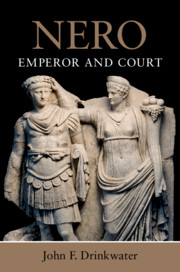Fifth-Century Gaul
A Crisis of Identity?
- Editors:
- John Drinkwater
- Hugh Elton
- Date Published: September 2002
- availability: Available
- format: Paperback
- isbn: 9780521529334
Paperback
Looking for an examination copy?
This title is not currently available for examination. However, if you are interested in the title for your course we can consider offering an examination copy. To register your interest please contact [email protected] providing details of the course you are teaching.
-
The papers presented in this book take as their subject the military, political and economic changes forced upon the inhabitants of Gaul during the fifth century AD. They seek to describe and explain how Gallo-Romans of all orders of society reacted to barbarian invasion and the growing debilitation of the western imperial government. The unusually wide range of topics dealt with allows the Gallic experience to be viewed and interpreted from many different directions. Much is made of the problematic, because highly subjective, nature of the literary sources; but close attention is also given to modern advances in our understanding of the archaeological and numismatic data. The whole presents a picture of a society under immense stress, as the people of the Gallic provinces abandoned, perforce, their allegiance to Roman emperors and yielded to the rule of Germanic kings, while yet preserving a significant element of their late antique culture.
Read more- The study of Roman Gaul in the fifth century, and the transformation of society, is a growing field, but there is no comprehensive account in English - our book therefore fills a gap
- Very difficult for one scholar to embrace all the different specialisations involved in the study of the late Roman and early medieval world - hence value of a collaborative work such as ours
- The editors have done an excellent job in shaping this book, arranging the chapters in logical sections and linking them with short introductory essays
Customer reviews
Not yet reviewed
Be the first to review
Review was not posted due to profanity
×Product details
- Date Published: September 2002
- format: Paperback
- isbn: 9780521529334
- length: 400 pages
- dimensions: 228 x 153 x 26 mm
- weight: 0.637kg
- availability: Available
Table of Contents
Chronological table
Introduction
Part I. The Literary Sources:
1. Continuity or calamity: the constraints of literary models I. N. Wood
2. From Gallia Romana to Gallia Gothica: the view from Spain R. W. Burgess
3. Looking back from the mid-century: the Gallic chronicler of 452 and the crisis of Honorius' reign S. Muhlberger
4. Old Kaspars: Attila's invasion of Gaul in the literary sources S. Barnish
Part II. The Gothic Settlement of 418:
5. The settlement of 418 I. S. Burns
6. Relations between Visigoths and Romans in fifth-century Gaul C. E. N. Nixon
7. Alaric's Goths: nation or army? W. Liebeschuetz
8. The emergence of the Visigothic kingdom P. Heather
Part III. The Immediate Crisis 406–418:
9. Barbarians in Gaul: the response of the poets M. Roberts
Part IV. Recovery: Social and Economic:
10. The Anicii of Gaul and Rome T. S. Mommaerts and D. H. Kelley
11. Meridional Gaul, trade and the Mediterranean economy in late antiquity R. B. Hitchner
12. Town and country in late antique Gaul: the example of Bordeaux H. Sivan
13. Bishops and cathedrals: order and diversity in the fifth-century urban landscape of southern Gaul S. T. Loseby
14. The fifth-century villa: new life or death postponed? J. Percival
Part V: Recovery: Political and Military:
15. Defence in fifth-century Gaul H. Elton
Part VI. A Crisis of Identity:
16. Roman, local and barbarian coinages in fifth-century Gaul C. E. King
17. The origins of the Reihengraberzivilisation: forty years on G. Halsall
18. The Bagaudae of fifth-century Gaul J. F. Drinkwater
19. Slavery, the Roman legacy R. Samson
20. Fifth-century visitors to Italy: business or pleasure? R. W. Mathisen
21. The 'affair' of Hilary of Arles (445) and Gallo-Roman identity in the fifth century M. Heinzelmann
22. Crisis and conversion in fifth-century Gaul: aristocrats and ascetics between 'horizontality' and 'verticality' M. A. Wes
23. Gaul and the Holy Land in the early fifth century E. D. Hunt
24. Ethnicity, orthodoxy and community in Salvian of Marseilles M. Maas
Part VII. The Resolution of the Crisis:
25. Emperors and emperors in fifth-century Gaul S. Fanning
26. Sidonius Apollinaris and the barbarians: a climate of treason? J. Harries
27. Un-Roman activities in late antique Gaul: the cases of Arvandus amd Seronatus H. C. Teitler
Part VIII. Conclusion:
28. The Pirenne thesis and fifth-century Gaul R. Van Dam
References
Index.
Sorry, this resource is locked
Please register or sign in to request access. If you are having problems accessing these resources please email [email protected]
Register Sign in» Proceed
You are now leaving the Cambridge University Press website. Your eBook purchase and download will be completed by our partner www.ebooks.com. Please see the permission section of the www.ebooks.com catalogue page for details of the print & copy limits on our eBooks.
Continue ×Are you sure you want to delete your account?
This cannot be undone.
Thank you for your feedback which will help us improve our service.
If you requested a response, we will make sure to get back to you shortly.
×
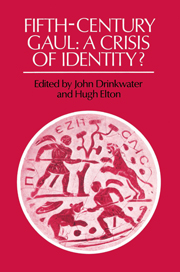
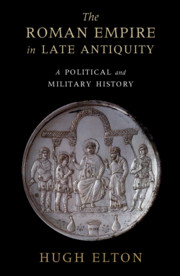
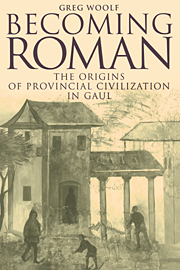
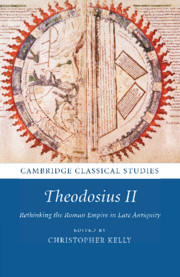
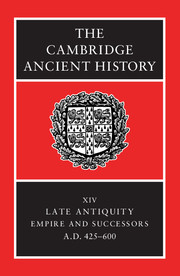
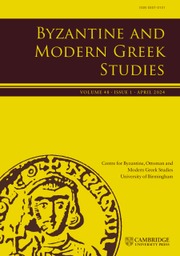
.jpg)
.jpg)

